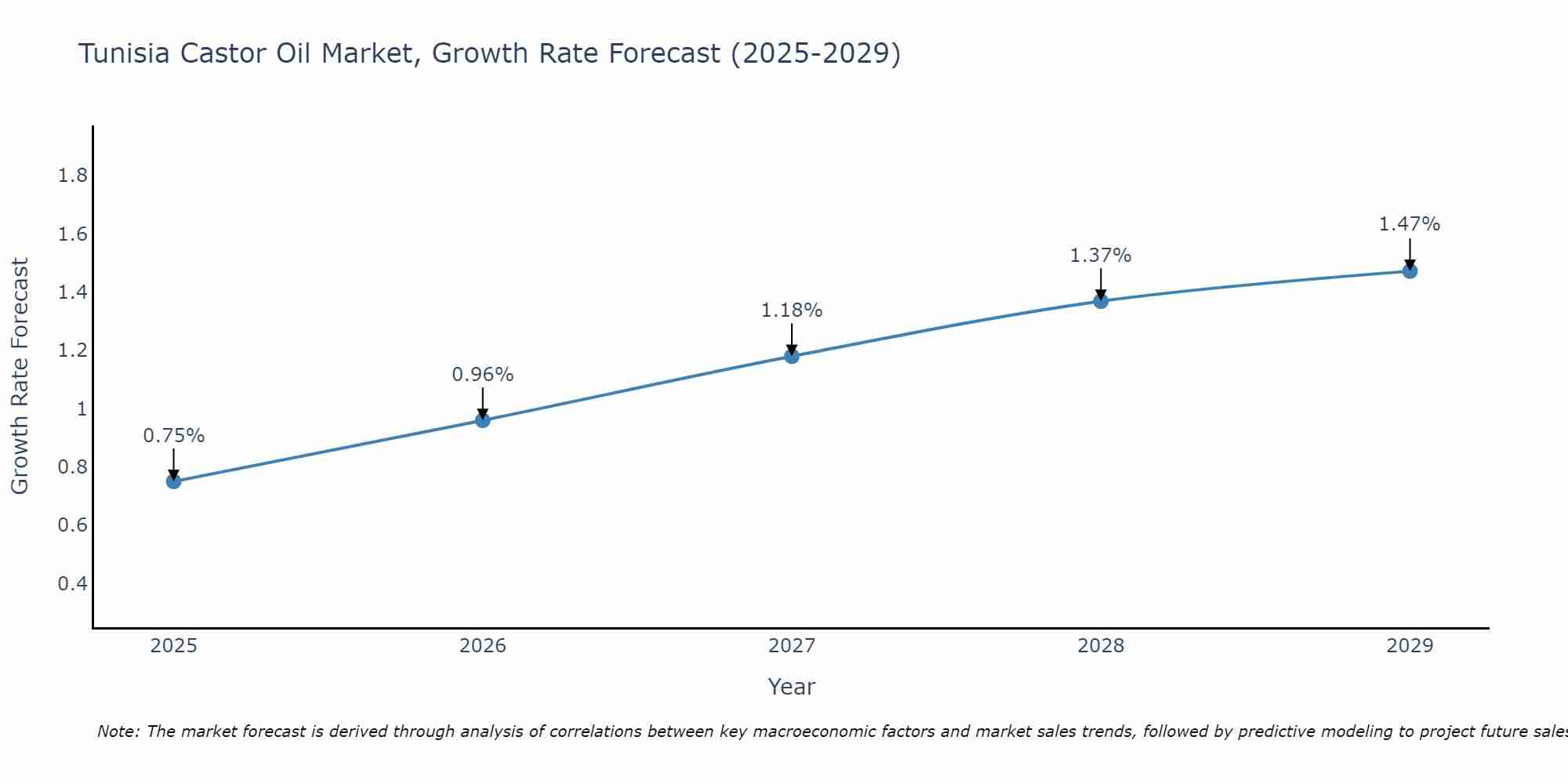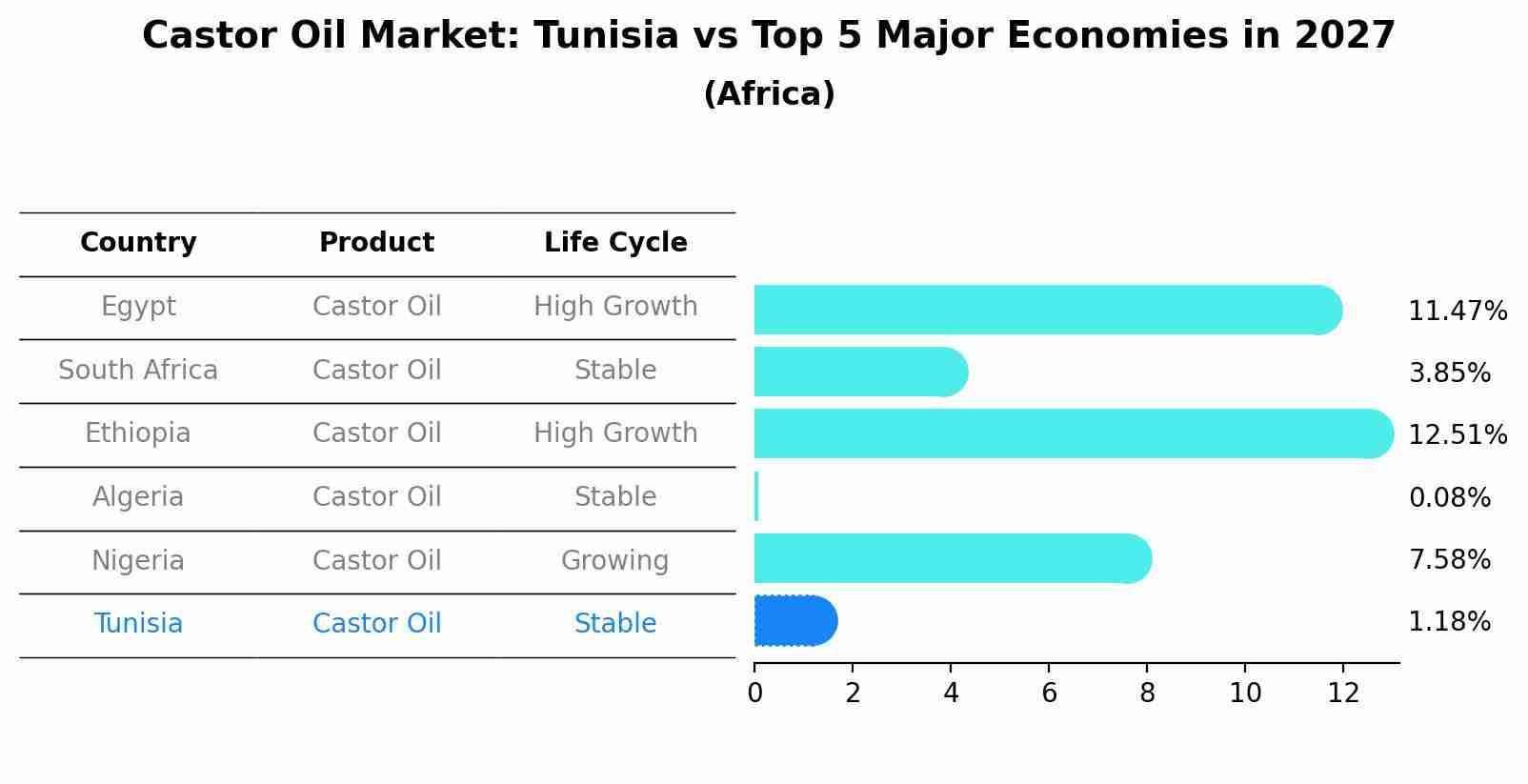Tunisia Castor Oil Market Outlook | Share, Forecast, Value, Companies, Size, Growth, Industry, Analysis, Trends, COVID-19 IMPACT & Revenue
| Product Code: ETC410090 | Publication Date: Oct 2022 | Updated Date: Apr 2025 | Product Type: Market Research Report | |
| Publisher: 6Wresearch | Author: Shubham Padhi | No. of Pages: 75 | No. of Figures: 35 | No. of Tables: 20 |
Tunisia Castor Oil Market Size Growth Rate
The Tunisia Castor Oil Market is likely to experience consistent growth rate gains over the period 2025 to 2029. From 0.75% in 2025, the growth rate steadily ascends to 1.47% in 2029.

Castor Oil Market: Tunisia vs Top 5 Major Economies in 2027 (Africa)
By 2027, Tunisia's Castor Oil market is forecasted to achieve a stable growth rate of 1.18%, with Egypt leading the Africa region, followed by South Africa, Ethiopia, Algeria and Nigeria.

Tunisia Castor Oil Market Overview
Castor oil in Tunisia is derived from castor beans and used in pharmaceuticals, cosmetics, and industrial applications for its medicinal properties, lubricating qualities, and renewable resource benefits.
Drivers of the market
The Tunisia castor oil market is driven by the increasing demand for castor oil in various industries, including pharmaceuticals, cosmetics, and industrial applications. Castor oil is known for its medicinal properties and is used in the production of soaps, lubricants, and coatings. Additionally, the growing focus on natural and sustainable products and the expansion of the bio-based chemicals industry further support market growth.
Challenges of the market
The main challenges in the Tunisia Castor Oil Market are related to high production costs and fluctuations in raw material prices. Additionally, there is competition from other types of vegetable oils and limited consumer awareness about the benefits of castor oil.
Government Policy of the market
Policies in Tunisia`s castor oil market emphasize sustainable agricultural practices and the development of value-added products. The government provides support through research and development grants, training for farmers, and marketing assistance to expand the market`s reach both locally and internationally. Environmental sustainability is a key focus, with policies encouraging eco-friendly farming methods.
Key Highlights of the Report:
- Tunisia Castor Oil Market Outlook
- Market Size of Tunisia Castor Oil Market, 2024
- Forecast of Tunisia Castor Oil Market, 2031
- Historical Data and Forecast of Tunisia Castor Oil Revenues & Volume for the Period 2018 - 2031
- Tunisia Castor Oil Market Trend Evolution
- Tunisia Castor Oil Market Drivers and Challenges
- Tunisia Castor Oil Price Trends
- Tunisia Castor Oil Porter's Five Forces
- Tunisia Castor Oil Industry Life Cycle
- Historical Data and Forecast of Tunisia Castor Oil Market Revenues & Volume By End Use for the Period 2018 - 2031
- Historical Data and Forecast of Tunisia Castor Oil Market Revenues & Volume By Pharmaceuticals for the Period 2018 - 2031
- Historical Data and Forecast of Tunisia Castor Oil Market Revenues & Volume By Lubricants for the Period 2018 - 2031
- Historical Data and Forecast of Tunisia Castor Oil Market Revenues & Volume By Paints for the Period 2018 - 2031
- Historical Data and Forecast of Tunisia Castor Oil Market Revenues & Volume By Soaps for the Period 2018 - 2031
- Historical Data and Forecast of Tunisia Castor Oil Market Revenues & Volume By Others for the Period 2018 - 2031
- Tunisia Castor Oil Import Export Trade Statistics
- Market Opportunity Assessment By End Use
- Tunisia Castor Oil Top Companies Market Share
- Tunisia Castor Oil Competitive Benchmarking By Technical and Operational Parameters
- Tunisia Castor Oil Company Profiles
- Tunisia Castor Oil Key Strategic Recommendations
Frequently Asked Questions About the Market Study (FAQs):
- Single User License$ 1,995
- Department License$ 2,400
- Site License$ 3,120
- Global License$ 3,795
Search
Thought Leadership and Analyst Meet
Our Clients
Related Reports
- Canada Oil and Gas Market (2026-2032) | Share, Segmentation, Value, Industry, Trends, Forecast, Analysis, Size & Revenue, Growth, Competitive Landscape, Outlook, Companies
- Germany Breakfast Food Market (2026-2032) | Industry, Share, Growth, Size, Companies, Value, Analysis, Revenue, Trends, Forecast & Outlook
- Australia Briquette Market (2025-2031) | Growth, Size, Revenue, Forecast, Analysis, Trends, Value, Share, Industry & Companies
- Vietnam System Integrator Market (2025-2031) | Size, Companies, Analysis, Industry, Value, Forecast, Growth, Trends, Revenue & Share
- ASEAN and Thailand Brain Health Supplements Market (2025-2031) | Strategy, Consumer Insights, Analysis, Investment Trends, Opportunities, Growth, Size, Share, Industry, Revenue, Segments, Value, Segmentation, Supply, Forecast, Restraints, Outlook, Competition, Drivers, Trends, Demand, Pricing Analysis, Competitive, Strategic Insights, Companies, Challenges
- ASEAN Bearings Market (2025-2031) | Strategy, Consumer Insights, Analysis, Investment Trends, Opportunities, Growth, Size, Share, Industry, Revenue, Segments, Value, Segmentation, Supply, Forecast, Restraints, Outlook, Competition, Drivers, Trends, Demand, Pricing Analysis, Competitive, Strategic Insights, Companies, Challenges
- Europe Flooring Market (2025-2031) | Outlook, Share, Industry, Trends, Forecast, Companies, Revenue, Size, Analysis, Growth & Value
- Saudi Arabia Manlift Market (2025-2031) | Outlook, Size, Growth, Trends, Companies, Industry, Revenue, Value, Share, Forecast & Analysis
- Uganda Excavator, Crane, and Wheel Loaders Market (2025-2031) | Strategy, Consumer Insights, Analysis, Investment Trends, Opportunities, Growth, Size, Share, Industry, Revenue, Segments, Value, Segmentation, Supply, Forecast, Restraints, Outlook, Competition, Drivers, Trends, Demand, Pricing Analysis, Competitive, Strategic Insights, Companies, Challenges
- Rwanda Excavator, Crane, and Wheel Loaders Market (2025-2031) | Strategy, Consumer Insights, Analysis, Investment Trends, Opportunities, Growth, Size, Share, Industry, Revenue, Segments, Value, Segmentation, Supply, Forecast, Restraints, Outlook, Competition, Drivers, Trends, Demand, Pricing Analysis, Competitive, Strategic Insights, Companies, Challenges
Industry Events and Analyst Meet
Whitepaper
- Middle East & Africa Commercial Security Market Click here to view more.
- Middle East & Africa Fire Safety Systems & Equipment Market Click here to view more.
- GCC Drone Market Click here to view more.
- Middle East Lighting Fixture Market Click here to view more.
- GCC Physical & Perimeter Security Market Click here to view more.
6WResearch In News
- Doha a strategic location for EV manufacturing hub: IPA Qatar
- Demand for luxury TVs surging in the GCC, says Samsung
- Empowering Growth: The Thriving Journey of Bangladesh’s Cable Industry
- Demand for luxury TVs surging in the GCC, says Samsung
- Video call with a traditional healer? Once unthinkable, it’s now common in South Africa
- Intelligent Buildings To Smooth GCC’s Path To Net Zero


















